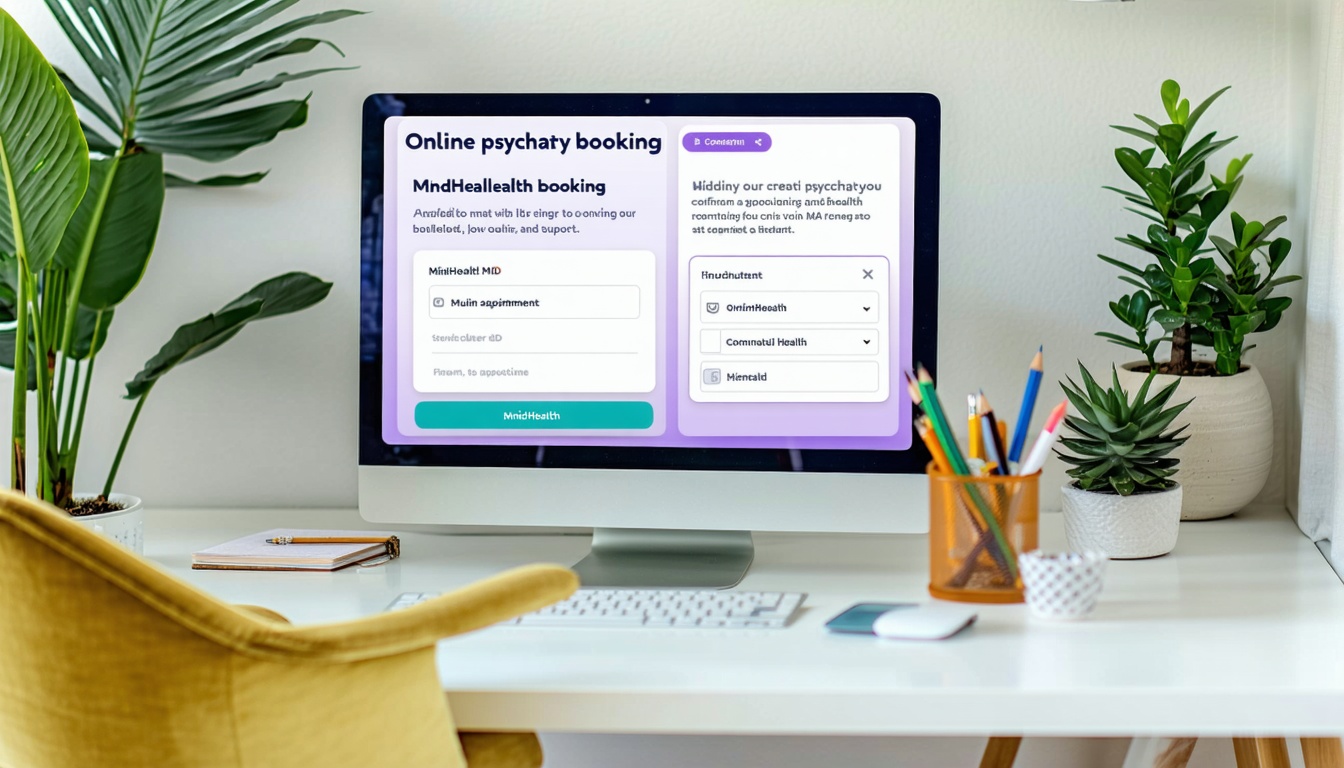Understand telehealth MAT consultation
If you’ve been exploring options to address substance use challenges, you might have come across something called a telehealth MAT consultation. MAT stands for Medication-Assisted Treatment, which combines prescribed medications with counseling or therapy to help you or a loved one navigate opioid, alcohol, or other substance dependencies. With telehealth, consultations and follow-up appointments happen remotely, so you don’t have to leave home or travel long distances to get care.
A telehealth MAT consultation is designed to evaluate your situation, determine the right treatment plan, and connect you with the providers best suited for your needs. According to the National Center for Biotechnology Information [1], telehealth-delivered MAT has shown promising results in improving retention and reducing substance use for patients with opioid use disorder. Even though MAT typically involves prescription medications and regular check-ins, telehealth makes it more convenient by allowing you to schedule and attend appointments from anywhere with an internet connection.
This remote approach originally gained traction to support rural communities lacking local mental health services. Over time, especially following COVID-19, it quickly became a mainstream option for individuals seeking flexible, discreet care. Researchers note that telehealth has been effective in diminishing barriers like transportation costs and scheduling conflicts, while also offering a cost-effective way to reach formerly underserved regions [2].
At MindHealth MD, you’ll find a team dedicated to harnessing the power of telehealth. Whether you need a straightforward medication assisted treatment plan, or you’re looking to supplement existing therapy sessions, a telehealth MAT consultation can bring the care right to you, often with fewer obstacles than in-person options.
You may be wondering, “How does it really work? Is it safe?” These questions are normal. Safety, effectiveness, and comfort matter, especially when you’re navigating a serious challenge like addiction or dependency. Telehealth sessions at MindHealth MD are conducted on secure platforms, so your private information remains protected. It’s similar to an in-person appointment, just without the physical clinic waiting room. You’ll still speak to trained professionals who take the time to understand what’s going on in your life—whether you’re comfortable talking openly, experiencing withdrawal symptoms, or just need guidance on how to manage cravings in a real-world environment.
If you’re not certain about the long-term plan or your insurance coverage, you can explore more with insurance accepted psychiatry or consider stepping into a virtual psychiatry session to see how it feels. Recovering from substance use is a process, and every person’s journey is different. With telehealth, you get an added layer of flexibility and comfort, which can be crucial for sticking with treatment long enough to see meaningful improvements.
Recognize the benefits of remote care
Remote care goes beyond convenience. It’s also a proven method of expanding access to individuals who previously couldn’t see specialists due to travel costs, long wait times, or stigma. If you or a loved one have ever felt hesitant about walking into a clinic for substance use, telehealth might reduce that anxiety by giving you a private space to talk things through.
And privacy isn’t the only perk. A telehealth MAT consultation can be scheduled around work, family obligations, or health issues that make it difficult to attend in-person visits. This scheduling freedom means you can often keep up with your everyday responsibilities while still receiving professional guidance. With MindHealth MD, you can request a same day psychiatric evaluation if you’re in need of immediate assistance or even opt for a 48 hour psychiatry booking if that aligns better with your schedule.
From a broader health perspective, telehealth services benefit communities with limited local resources. Rural areas, for example, may face a significant shortage of mental health providers who can dispense and oversee medication-assisted therapy. Telehealth helps bridge this gap, increasing the likelihood of starting and staying in treatment. According to studies published on NCBI, telehealth has proven cost-effective by reducing overall healthcare spending and boosting efficiency. It also allows healthcare providers to monitor patients in real-time, ensuring that medication protocols can be tweaked promptly if side effects or other concerns arise.
If you’ve been thinking about broader mental health support, like addressing anxiety, depression, or even co-occurring disorders, remote care can coordinate everything in one cohesive approach. Telehealth isn’t just about facilitating a single type of treatment, but rather integrating various tools—like therapy sessions, prescription management, and ongoing check-ins—under a unified platform. This model helps you maintain momentum and accountability.
MindHealth MD is here to ensure you don’t feel lost in the process. You can easily schedule a book psychiatric appointment online or even tap into the specialized co occurring disorders treatment if you need support beyond substance concerns. By structuring a holistic plan, remote care can help you move forward without uprooting your daily routines or depleting your energy.
Explore MindHealth MD’s approach
You might be wondering, “So what sets MindHealth MD apart?” The answer, in short, is personalized and comprehensive care. MindHealth MD focuses on telehealth psychiatry, including advanced medication-assisted treatment for people struggling with opioid or alcohol dependence. There’s also the option to incorporate therapies like transcranial magnetic stimulation (TMS), ensuring that you have a full suite of mental health services within reach. In essence, the clinic doesn’t just address one piece of the puzzle—it aims to integrate multiple therapies as part of a broader approach to overall well-being.
For instance, you can start with an adult psychiatry intake appointment to discuss your medical history, substance use behaviors, and any co-existing mental health conditions like PTSD or OCD. Afterward, you might proceed with a specialized mat for opioid addiction, if opioid dependence is your main concern, or a mat for alcohol dependency if you’re battling alcoholism. MindHealth MD sees each step as part of a carefully tailored plan.
This integrated approach includes talk therapy sessions, medication management, and regular follow-ups that track your progress. The idea is to offer you the tools needed to work through the social, emotional, and physical aspects of recovery. Since you’re meeting from the comfort of home, it’s often easier to open up and share day-to-day struggles, whether that’s stress at work, tension in relationships, or discouragement about setbacks. By having these check-ins frequently, you can get adjustments to your prescription plan or emotional support as needed, rather than trying to squeeze everything into a brief monthly visit.
You’ll also find that logistical issues, such as finding child care or taking time off from work, become less burdensome with an online format. Meanwhile, MindHealth MD’s staff remains ready to tackle immediate issues—like withdrawal symptoms or cravings—through a substance use psychiatry service that’s structured around your needs. And if you ever decide you need an in-person visit or more intensive approach, the team can help coordinate that as well.
At MindHealth MD, the goal is to meet you where you are. Telehealth is just one vehicle that connects you to the resources and specialists who can make a real difference in your life. If you’re not sure how to begin, consider scheduling your first telepsychiatry appointment. An initial consultation can clarify the next steps, such as whether medication is recommended, how often you should check in, or if additional therapies like TMS would be beneficial.
See how TMS therapy fits in
TMS therapy, short for transcranial magnetic stimulation, targets specific areas of the brain through magnetic pulses to help people dealing with conditions like depression. Researchers have recognized TMS as a promising option for individuals who haven’t responded well to traditional medications. MindHealth MD doesn’t just offer TMS in isolation, though; it’s part of an integrated model that might include a telehealth MAT consultation if you’re dealing with a substance use disorder as well.
So how does TMS connect to substance use treatment? Many individuals struggle with co-occurring conditions—simultaneous mental health disorders, like depression or anxiety, alongside substance dependence. Intensive cravings can often be tied to emotional triggers, and TMS therapy for depression can reduce the symptoms that worsen those cravings. In parallel, if you’re enrolled in a tms therapy for depression program, it may boost your motivation to stay consistent with a MAT regimen. You could also explore an eeg for treatment planning if deeper diagnostic insights into brain activity might assist in tailoring therapies.
MindHealth MD often pairs medication-assisted treatment (e.g., buprenorphine, naltrexone, or other approved medications) with TMS. The primary reason is that a multi-pronged approach can amplify positive outcomes. One therapy targets the side effects and cravings tied to substance use, while TMS works on neural pathways associated with mood regulation. Neither method is a magic wand; each requires perseverance, check-ins, and professional guidance. But used in concert, they can form a dynamic duo that addresses both underlying depression and active addiction symptoms.
Should you opt for TMS, you’ll likely follow a schedule of regular sessions over a few weeks. Because TMS is a non-invasive procedure, you won’t need anesthesia, and you can often resume your normal activities right after each session. The process doesn’t disrupt your telehealth appointments, either. You can continue meeting with your doctor online to discuss medication updates, track your mental health, or clock progress on substance use goals. If you’d like to learn more about this combined path, you can always schedule tms treatment to find out how TMS could fit into your journey.
Tackle common barriers and concerns
Some people worry that remote appointments can’t match the intimacy or thoroughness of in-person sessions. It’s understandable to question whether a telehealth MAT consultation can measure up. Based on data from the University of Maryland, Baltimore’s Department of Psychiatry, mobile-care units and remote sessions have proven effective for underserved communities needing both mental health and substance abuse services [3]. While the format is different, the dedication to patient well-being remains the same.
Another common hurdle is licensure and regulation. Right now, healthcare providers must meet certain requirements for prescribing controlled substances or offering MAT across state lines. Regulatory changes during the pandemic have relaxed some of these restrictions, allowing more flexible care. Providers at MindHealth MD stay up to date with these rules, so you don’t have to worry as much about the fine print. The same goes for technology: if you’re new to telehealth, MindHealth MD staff help you set up your device and understand how to navigate the video or phone platform. Safety and privacy remain high priorities, no matter where you’re accessing care.
You might also be concerned about confidentiality and insurance coverage. Telehealth sessions at MindHealth MD use secure, HIPAA-compliant systems, so your personal information stays protected. As for coverage, more insurance companies now recognize telehealth as a viable service, making it likely that your appointments are reimbursable or included in your benefits. If you have questions about specifics, consider checking out in network psychiatry care to see how MindHealth MD coordinates with various insurance providers.
In situations where you need immediate help—like a sudden escalation in cravings—a virtual format might actually expedite relief. You can reach out for a mental health urgent appointment instead of waiting for an in-office visit. And if you’re dealing with a more complex set of mental health symptoms, a telehealth team can facilitate a co-occurring disorders treatment plan so you get a thorough approach rather than piecemeal solutions.
Combine telepsychiatry and MAT
Telepsychiatry refers to psychiatric services delivered over a virtual platform. It goes hand in hand with MAT, especially when you need consistent medication management and follow-up. For some patients, a single conversation might not be enough to address all side effects, dosage adjustments, or behavioral challenges. Telepsychiatry makes it easier to schedule frequent—but short—sessions that can quickly recalibrate your treatment if something changes.
At MindHealth MD, physicians and therapists can assess your progress practically in real time. Suppose your cravings spike after a stressful workweek. Instead of waiting a month or two for your next in-person appointment, you could set up a telepsychiatry follow-up within days, or even hours, depending on urgency. They’ll discuss whether your medication regimen, such as buprenorphine or a naltrexone injection, needs fine-tuning. You might also explore short-term counseling or a short term psychiatry session to develop coping skills that keep you on track.
For individuals with opioid dependence, mat for opioid addiction often includes weekly or bi-weekly check-ins during the early phases. Having telehealth as an option reduces the time you spend commuting and waiting in lobbies, which can lower the temptation to skip appointments when motivation is low. It’s all about having a system that supports you consistently and conveniently, so small obstacles don’t derail the bigger picture of sobriety.
Beyond opioids, medication-assisted therapy can apply to alcohol dependency as well. A mat for alcohol dependency plan may involve FDA-approved medications to reduce cravings or harmful drinking behaviors. When accompanied by telepsychiatry, you’ll have multiple touchpoints to gauge your emotional well-being, handle lapses, or make real-time lifestyle adjustments. If you find you need more in-depth therapy or a different approach, MindHealth MD can pivot quickly to address that.
Stay informed with ongoing support
Recovery is rarely a linear path. There could be moments when everything seems to click, and others when it feels like you’re back at square one. Consistent support makes the difference between a lapse becoming a learning experience versus a complete relapse. That’s why MindHealth MD prioritizes ongoing services, offering psychiatric medication management, therapy check-ins, and progress tracking that extend well beyond your initial appointment.
These regular follow-ups might happen weekly during the early phase, then transition to bi-weekly or monthly once you’re stable. The goal is to keep an eye on your medication’s effectiveness, any mood swings, side effects, or changing personal circumstances. Sometimes you’ll have breakthroughs that warrant a lower medication dose. Other times, life stressors may prompt an increase in counseling sessions. Because telehealth is so flexible, these adjustments can be handled without a multi-week wait.
Staying informed also means understanding your condition better. MindHealth MD encourages you to ask questions, read up on the resources provided, and follow up with any concerns about new or existing prescriptions. If you need advanced diagnostic tools, you can request an eeg diagnostic for mental health to gain a clearer clinical picture. Telehealth allows for quick sharing of those results so you can discuss them with your provider without any delays.
And if you complete a successful round of MAT or TMS therapy, the conversation doesn’t end. Maintenance care can be crucial for preventing relapse and ensuring you remain on a positive trajectory. MindHealth MD’s platform is geared toward a seamless transition from intensive treatment to less frequent, but still consistent, sessions. That way, you never feel like you’re managing the next stage of recovery entirely on your own.
Decide why MindHealth MD is right
Choosing the right provider is a deeply personal decision. MindHealth MD aims to simplify that choice by offering comprehensive mental health services under one roof, from a telehealth MAT consultation to TMS therapy and beyond. This diversity of treatments helps ensure that you have more than a one-size-fits-all plan—your path can be customized to your unique medical and psychological profile.
As you consider MindHealth MD, you might be drawn to its strong commitment to accessible care. The team understands that life is busy and often unpredictable. The ability to book an online psychiatry booking or an immediate psychiatry appointment can make a world of difference when you’re in a tight spot. You’ll find professionals who are comfortable deploying different therapy methods—cognitive behavioral therapy, motivational interviewing, TMS, and more—and who can pivot if something isn’t working.
MindHealth MD also respects the roles of family and friends who are supporting your recovery journey. If you want to invite a loved one to join a video call for moral support (when clinically appropriate), that can often be arranged. There’s also guidance available if you need family-based counseling or want advice on how to handle triggers at home.
Insurance coverage is another factor. Many individuals worry they’ll be stuck with out-of-pocket costs for telehealth services. That’s why MindHealth MD offers in network psychiatry care and is set up to be flexible. If you’ve got specific questions, you can easily phone or message the office to clarify coverage details. For those who prefer a direct, out-of-pocket route, self pay psychiatry session options might be the simplest choice.
Above all, MindHealth MD’s main priority is helping you or your loved ones achieve meaningful, sustainable improvement. Whether that means reducing your cravings, conquering depression, or enhancing overall mental stability, the team is there with you each step of the way. If you’ve been on the fence, consider requesting a call to refer patient psychiatry to begin the conversation. Making that first move is often the hardest step, but it’s also the most critical one.
Frequently asked questions
What makes a telehealth MAT consultation different from in-person MAT?
A telehealth MAT consultation happens over video or phone rather than face to face. You still engage with qualified professionals who assess your needs, prescribe medication, and guide your therapy plan. The main difference is that you don’t have to visit a clinic, which reduces traveling time and improves convenience.
Does insurance cover telehealth MAT appointments?
Yes, in most cases. Many insurance plans expanded their coverage to include telehealth, recognizing it as an essential service. MindHealth MD also provides in network psychiatry care to help you check your coverage. If you have concerns about copays or deductibles, the office can assist in confirming specifics.
Is telehealth suitable for co-occurring conditions?
Absolutely. Telehealth services at MindHealth MD can be tailored to address multiple mental health concerns, whether it’s PTSD, depression, or OCD alongside substance use. They offer co occurring disorders treatment so you don’t have to juggle separate providers or different appointment locations.
What technology do I need for telehealth?
All you typically need is a reliable internet connection, a computer or smartphone, and a private space where you feel comfortable talking. MindHealth MD’s team will give you instructions on any prospective telehealth platform so you can get set up in minutes.
How do I start if I’m ready for treatment?
You can begin by scheduling an adult psychiatry intake appointment or a telepsychiatry appointment at MindHealth MD. During that first session, you’ll discuss your history, current symptoms, and goals. From there, your provider will help determine the right medication plan, therapy options, or TMS therapy if indicated.
Deciding to begin treatment for substance use or mental health struggles is a monumental step. By choosing a telehealth MAT consultation from MindHealth MD, you can seamlessly integrate expert help into your daily life, lessening the burden of commutes and logistical challenges. Whether you’re balancing a full-time job, family responsibilities, or simply don’t have easy access to specialized facilities, telehealth can place top-tier care right at your fingertips.
If you’re still uncertain, consider taking that first small step. Book an appointment, ask questions, and see how the flexibility of telehealth might be a game-changer for you or your loved one. Recovery and improved mental well-being are absolutely possible with the right blend of professional expertise and consistent support—and MindHealth MD is here to guide you every step of the way.








